|
Short Fiction ~ Cath Barton First Prize, Strands International Flash Fiction Competition - 10 There had once been an uninterrupted vista across the park. The sun still rose behind the three-winged Georgian house – the worse efforts of man could do nothing to change that – but a tarmac road now sliced through the avenue of trees that had lined the original carriageway from the gates. The oaks to the west of the road had split and been felled, and those on the house side had grown so thick that its facade was hidden from view. Marcia Brice-Martin, visiting with her husband from Ormonville, a one-street town of clapboard houses in the American Mid West, was none the less enchanted. ‘This is so pretty,’ she trilled to the girl selling entrance tickets from a window cut in a portacabin. ‘Back home we have only – ’ ‘House and garden or just garden?’ interrupted the unsmiling girl. Her shift should have finished an hour earlier and she was feeling the heat inside the metal box. ‘Excuse me?’ said Marcia, who had forgotten to put in her hearing aids that morning. The girl sighed and repeated the options slowly. Marcia’s husband bristled and stepped forward. If he’d been back home, he would have had his hand on his gun. ‘Two tickets for the complete package,’ he barked at the girl. ‘Elmer’, Mrs B-M started in a high voice, ‘Don’t you think–?’ As he lifted an arm to silence her, she noticed, as she had earlier that morning, how prominent the veins were on the backs of his hands. ‘We will take the tour, Marcia,’ he said. ‘You wanted to come here. We will damn well see it out.’ He would have slammed his hand on the counter to emphasise the point, but there was no counter, only the sliding plastic window behind which the girl sat with the tickets. Marcia, who would have preferred to have simply strolled round the walled garden before taking tea, knew better than to argue. ‘Tours start on the hour,’ the girl said in a flat voice. ‘Forty minutes round the East Wing of the house. Stay with the guide at all times.’ As they walked towards the house Elmer Brice-Martin stumbled and clung to his wife’s arm. ‘Your stick, Elmer, we should go back to the car and fetch it,’ she said, her voice rising again. ‘Don’t fuss, Marcia, it’s this damned gravel the English lay on their paths. Designed to trip a guy up.’ The Brice-Martins were nearing the end of the 3pm tour when Trenchant Collier, a local boy whose father had worked in the gardens of the house two hundred years previously, woke from a long sleep in one of the furthest greenhouses, which were out of bounds to visitors, and went in search of something to eat. As he entered the old kitchen, which had been kept exactly as it was in the early 1800s, except that the joints of meat and loaves of bread were plastic replicas, the boy was surprised to see the small gaggle of people dressed in clothes strange to him, and equally surprised when he bit into a loaf of bread and found it impossible to chew. None of the visitors saw Trenchant, but Marcia felt his aura. She said nothing to her husband; he was a sceptic who preferred the feel of cold hard metal to stories of the insubstantial. In the conservatory tea-room they ordered cream teas, though, looking at the veins standing out on her husband’s forehead now as well as his hands, Marcia wondered about the wisdom of this. ‘Don’t you think–?’, she started as Elmer spread strawberry jam thickly on half a large scone. ‘For heaven’s sake, Marcia, can’t you let a man enjoy a bit of fruit?’ Elmer heard his voice ricochet off the glass of the conservatory roof like a spray of gunfire. The legs of the wicker chair into which he had squeezed himself buckled as he instinctively ducked down. He reached out for one of the table legs to steady himself, but caught only the trailing edge of the tablecloth. Trenchant Collier, who just had come into the tea room, was still in search of something he could eat. The girl whose job was to stop children from poking their fingers into the cake icing had been distracted by the unfolding calamity at Table 3, and in any case would not have seen Trenchant pick up the apricot and walnut loaf which she had just taken out of the freezer and attempt to bite into it. Marcia was wailing, thinking this was the heart attack she had long feared would carry her husband off. He, on his back like a stranded beetle, was impeded in his struggle to right himself by the tangle of tablecloth. The floor was splattered with sticky jam and cream and tea was trickling under the neighbouring tables. Trenchant picked up a scone rolling in his direction and smeared it with butter that had been left on another table. Relieved to find something edible, he sat down and watched the drama unfold. Marcia, feeling Trenchant’s aura again, and now convinced that her husband was about to die, cried out even more loudly. ‘For heaven’s sake, woman, pull yourself together!’ Elmer, who had managed to get to his feet remarkably unsullied by jam and cream, sank heavily onto another chair which wobbled but remained upright. ‘More tea, waitress,’ he called to the hapless girl who was trying, single-handedly, to clear up the mess. She scurried into the kitchen. Marcia felt Trenchant depart. Elmer was still with her. The waitress brought tea and more scones. ‘On the house,’ she said. Neither of the Brice-Martins had any idea what she meant, but both feeling somewhat shaken, tucked in. ‘You need to ask for the recipe for these, Marcia,’ said Elmer. ‘They’re real good.’ She did not reply. Her thoughts had turned to the ghost story she was going to relate to the Women’s Home Guild when they got back to Ormonville. ~ 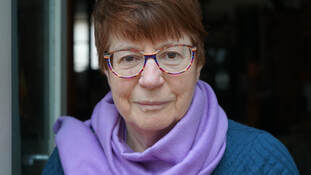 Cath Barton is an English writer who lives in South Wales. She won the New Welsh Writing AmeriCymru Prize for the Novella 2017 for The Plankton Collector, now published by New Welsh Review under their Rarebyte imprint. Her second novella, In the Sweep of the Bay, will be published in November 2020 by Louise Walters Books. Cath’s short stories have been published by print magazines including The Lonely Crowd and Strix, as well as in a number of anthologies. She is also active in the online flash fiction community. Website: https://cathbarton.com Twitter: @CathBarton1
0 Comments
Short Fiction ~ Kasturi Patra Second Prize, Strands International Flash Fiction Competition - 10 I read the first few lines of the bestselling thriller for the fifth time. Still, nothing registered. The oil-stained suede couch sagged further, its springs creaking in agony, as I slouched to make myself invisible to the people in my parents’ living room. It was difficult to ignore their words though. “Forty-two and still single, chhi chhi…are you sure she isn’t, you know…” Neela Kakima let those words hang in the air. I doubted whether she actually believed her hoarse “whispers” wouldn’t reach me in the balcony. “Na na, nothing like that,” Ma sounded apologetic, “we’ve talked about that, too.” Baba cleared his throat; he was an expert at squashing uncomfortable conversations be it the refugee crisis in Syria or his own daughter’s sexual orientation. In my peripheral vision, I noticed Arnab Kaku rubbing his thick, hairy knuckles over his potbelly, bits of his protruding stomach visible from between the straining shirt buttons. His fingers adorned with gemstone rings, looked like a grotesque rainbow. I threw up a bit inside my mouth when he stuffed his face with the jaggery sondesh and spoke with his mouth full, “Girls these days are getting too much freedom and that’s getting into their heads,” unlike his wife, he didn’t pretend to whisper, “I keep telling Neela how lucky we are to have a son.” I chucked the paperback with a splat on the coffee table and stood up. My breathing slowed down only after I reached my childhood bedroom upstairs. My parents hadn’t changed it much since Didi and I left—the walls were adorned with our artwork in crayons, the door of the steel almirah was studded with stickers from popular nineties cartoons—Powerpuff Girls, TaleSpin, Duck Tales. On top of the study table sat a picture frame that held a photo of Didi and me squinting at the camera, wearing identical batik printed frocks. The soft, pudgy body squashing against my back, smelling of apple shampoo and cocoa butter, woke me up from my fitful slumber. “Rinki!” I sat in a puddle of sleep induced daze mixed with the affection that I reserved only for my six-year-old niece. She crawled into my lap screaming, “Mashiiii”, I dipped my face into her curly hair wishing I could bottle her earthy scent of childhood and take it back with me when I left Kolkata. “I hate to break the aunt niece reunion but I have to,” my elder sister stepped into the room smiling affectionately, “Rinki, go down for lunch, I’ll come with Mashi in a minute.” Didi didn’t ask me why I was sitting on my own in this dark room when there were guests downstairs, instead she took me in her arms. I rested my head on her shoulders just like I used to on nights when I was certain the monster was calling me from atop the palm tree outside the window. My visits to Kolkata wouldn’t have been so frequent if it weren’t for my sister and my niece. At the lunch table, Didi tried veering the conversation into neutral territories. “Congratulations, on your admission to the MIT, Riju!” Didi put on a big smile and looked expectantly at the young man who was grinning at his crotch while typing furiously on his phone under the table. Neela Kakima nudged her son and muttered something, perhaps reminding him that my parents hosted this lunch to honor his “grand success”. “Thanks,” he shrugged. Didi gave me a sideways glance, I shook my head and put a little bit of rice mixed with chicken curry into Rinki’s open mouth. “From the moment he ranked twentieth in the IIT entrance exam, I was certain that my boy is going to make it to the MIT,” Arnab Kaku beamed while his son was once again lost into the fascinating world inside his phone. “Yes, Riju has always been a gem of a boy! From topping his classes to representing his school in quizzes and cricket matches. You guys have been extremely lucky!” Ma cooed while serving Riju the juiciest pieces of mutton, maybe, as a reward for his hard work. Post lunch, Didi and I lay stretched on our childhood bed, our legs sticking out, our heads huddled in a single pillow, as we traded news of our lives. My parents had taken Rinki to their room for an afternoon nap. The three guests were in the guestroom, probably gearing up for their next meal. After a while, I got up to make our favorite masala tea. On my way to the kitchen, I noticed my parents watching a Bengali soap on TV. “Where’s Rinki?” I leaned into their darkened room searching for her small body lying curled up next to my mother. “Riju took her to the terrace.” I sprinted down the corridor and climbed two stairs at a time, my parents called out after me, but I didn’t stop. When I pushed open the terrace door with a creak, there was no sign of anyone except for a few sparrows perched on the bird feeder pecking at the rice Ma had left for them. The voice came from behind the water tank, a smooth, seductive whisper, so familiar sounding, like a silk scarf tightening around my throat. I instinctively grew quieter, tiptoeing to the place from where the sound came. Rinki’s purple frilly frock was hitched up while Riju tickled her thighs, his fingers crawling upward, “I’m coming now, hau mau khau, manusher gondho pau…” those words that scared me as a child, the words of a monster who could smell human blood. I shoved him so hard that he lost his balance and fell flat on his back. I could hear footsteps behind me. Looking at the faces surrounding me, I let out a wail that I’d been holding inside for the last thirty-five years. When I could finally breathe, I told them, “Arnab Kaku is indeed lucky to have a son who is just like his father.” ~  Kasturi Patra is a writer and editor. Her work has appeared in Jaggery Lit Mag, Litbreak Magazine, Bengal Write Ahead, Escape Velocity, 50-Word Stories, and Women’s Web. Her fiction is forthcoming in Lakeview International Journal and in TMYS Review. She is a reader for Voyage: A Young Adult Literary Journal. She recently won a novel pitch competition and her novel is forthcoming next year from Half Baked Beans Publishers. She is pursuing an MFA in Fiction from Writers' Village University. She lives in New Delhi, India, with her husband and four adopted animals. Short Fiction ~ Brindley Hallam Dennis Third Prize, Strands International Flash Fiction Competition - 10 The fact is, I never felt that far away, he said, from home. He sipped at his whisky. It’s the other side of the world, I said. But you don’t notice that, he said. It’s because we travelled by air, he said. You just sit in the plane. We couldn’t see out of the windows. If we’d gone by train it would have been different. It would have taken a hell of a lot longer, I said. But we’d have seen all that countryside passing by. We’d have had to make sea crossings as well. We’d have seen the distance, not just spent the time. I could see what he meant, and I sipped at my whisky. It was like that with Mel; with Mel and me. Only not like that. About distance being what you felt, not what it really was. Sometimes I wondered about walking there, to where she lived. I wondered about putting everything I needed, really needed, into a bag and walking out of the house and keeping on going until I got there, to where she lived. That would take days. It would take weeks. It would take the best part of a day by train, or even to drive down, but I never thought about taking a train, or driving. I always thought about walking there. It’s not about just the distance. It’s about what you have to overcome to get there. It’s about what you have to overcome to start out. That’s not all it’s about. It’s about it being a penance too. A penance for not having made the journey already. Every day on the road would be an act of contrition. Each one for a year of procrastination, near enough, depending on when you start counting. It would be a demonstration too, a demonstration of how much you cared, of how sorry you were, at least, that’s what I told myself, whenever I wondered, about walking there, to where she lived. It would give them time, as well, walking there, give them time to get used to the idea; time to work out what was going on, what it all meant, retrospectively, and for the future. That’s what I told myself too. And word would get down to her, word that I was on my way. Somehow, word would get down to her, because someone, someone, who knew me, would work it out, in the time it would take me to get there, walking, to where she lived. And that would give her time too, time to prepare for it, for me getting there. It would be on Social Media, or a phone call, by word of mouth. He’s gone missing, they’d tell her. He’s walked out, they’d say. He’s vanished. Nobody knows where. And perhaps, then, they’d wait, to see how she reacted. She’d know right away. Of course she would. She’d know. I think he’s coming here, she’d say, and then she’d look at them, to see how they reacted. Where else would he go, she’d ask? Where else could she imagine I would ever go, if I walked out like that? She’d still have time to think, after they told her, before I got there; time to make plans, to clear the decks, to get ready. She might even want to come out and look for me. The closer I got, the fewer roads there would be to look for me on. She could work it out, whatever the route I took, there would be fewer roads to choose the closer I got to where she lived. And when I get there, where she lives, she’ll be watching for me, from an upstairs window, or behind a curtain, or maybe even on the threshold. And at nights she’ll leave an outside light on so that I’ll be able to find my way, and she’ll maybe even leave the door unlocked, because whatever people think, and whatever they say, I know she’ll be wanting me to arrive, and she’ll be wanting me to have walked all the way. It couldn’t be any other way, for Mel; for Mel and me. It’s in the winter that I wonder most, about walking to where she lived, when the days are short and grey and wet. I wonder on the bleakest days, and in the longest nights. And then the Spring comes around, and I forget, and another year has gone. Isn’t it? He says, and I realise he’s been talking all the time I’ve been thinking and I see that he’s filled up both our glasses again, but I have no idea what he’s asked me, nor what the answer is, and he, sensing that I have no answer, says, it’s a hell of a distance. Yes, I say, it is a hell of a distance. ~  Brindley Hallam Dennis lives on the edge of England within sight of Scotland. He writes short stories. Writing as Mike Smith he has published poems, plays and essays, often on the short story form and on adaptations from texts to film & TV. Many of his stories have been published and performed, sometimes by Liars League in London, Hong Kong, and elsewhere. He holds the degree of M.Litt from Glasgow University. Short Fiction ~ Karenne Griffin Third Prize, Strands International Flash Fiction Competition - 10 He walked along the beach, kicking at pebbles, his heart in the soles of his well-worn trainers. Why? he kept asking. The question churning slowly, as did the sea to his left. Grey water that slopped listlessly, tumbling the pebbles with a soft rattle. He cast his eyes across the calm, metallic sheet, unable to determine the horizon. Grey, grey everywhere. Except for the pebbles. They ranged between black, white and many shades of brown. Rounded gently by the sea. He bent to pick up a piece of something green: glass that had also been worn smooth by the sea. This fragment was a delicate eau de nil. Not that he’d ever seen the Nile, but he’d crossed a river that colour in Afghanistan, tumbling from the mountains in its haste to reach the sea. It had taken Jawad years to save enough for the hellish voyage across Europe that had culminated in a couple of hours in a small boat to England. He had made his home in this damp, grey land, thankful at first to be alive. But now he wasn’t so sure. For when his wife and son had followed two years later, they hadn’t been so fortunate. Sometimes he walked to the large cemetery at the top of the hill and wandered along the avenue of cypresses until he came to their graves, marked only with wooden stakes. Somehow he must find the energy to save enough to replace these flimsy reminders of Samia and Ahmed with stones in a colour other than grey. White granite would be wonderful, but it was very expensive. He preferred visiting this beach rather than going to the graveyard. This was the place their bodies had landed, limp and lifeless after the storm had swamped their boat. Jawad had waited on the shore, his misgivings growing as many hours passed. The ruthless man who had taken his thousands of pounds in exchange for delivering Samia and Ahmed had fortunately also drowned. Otherwise he would have felt obliged to kill him. Jawad’s foot kicked angrily at the pebbles, turning up another piece of glass. This one white like the ice that formed in winter, in this land as well as his own. Though Afghanistan wasn’t really his land anymore. He doubted he would ever return. He picked up the glass and held it to the light, then placed it in the pocket of his jacket with the first one. They would join others in a drawer at his bedsit. His collection embodied the many tears Jawad had cried since Samia and Ahmed had been snatched from him at the eleventh hour. It seemed apt that nobody knew where sea glass originated. He wondered whether it would be possible to make headstones from flat rock, and fix these tears of glass to their surfaces, in memory of his lost loved ones. ~ 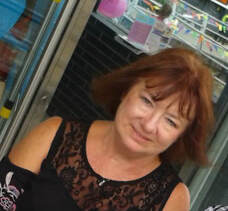 Karenne Griffin is the author of five novels and two travel books. Born in Australia, she has spent most of her life in the UK, and the past 20 years in Wales. When not writing she enjoys country walks. She has eclectic tastes that exceed her budget, and her alter ego is a flamingo. Short Fiction ~ Adam Kelly Morton Honourable Mention, Strands International Flash Fiction Competition - 10 Lana’s asleep beside me when my cell rings. I kiss her naked shoulder and reach across her to my bedside table. It’s Rob. He tells me that Ricky’s dead. * The ice at the park was too soft to skate on, so we were in our boots, taking slap shots. Over on the hill, kids were tobogganing. We could hear their shouts over the echoes of our stick blades cracking, pucks thudding into the stained white wood. Then one of my shots went sailing over the boards, right to where Rob’s eight-year-old brother Ricky was pulling his sled up towards the chalet. The puck hit him in the face. I dropped my stick and ran over to where he had collapsed. There was blood all over the snow. * “You going over now?” Lana says, leaning on our bedroom door frame. “Yeah,” I say, pulling on my shoes. “How old was he?” “Eighteen.” “My god,” she says. We hug, and I walk out of our apartment into the May sun. I drive over to Rob’s folks’ house back on Harmony Street. My mom still lives a few doors up. I knock on Rob’s porch door and step in. Their living room is full of silver-framed pictures of Rob and Ricky. Rob’s mom, Lorna, comes in from the kitchen. “Hi Alan,” she says. “Can I get you something? Tea? Water?” “No, thanks,” I say. “Okie doke,” she says. I watch her go back into the kitchen, and I sit down on one of the green felt armchairs. Everything in this room is green or silver. Clean. Rob walks in from the hall. “Hey,” he says. I stand up and give him a hug. We sit back down, with Rob on the sofa across from me. “You okay?” I say. “I guess,” he says. I lower my voice: “What happened?” He stands up. “Let’s go downstairs,” he says. We walk into the kitchen, past Lorna, who’s spreading margarine onto white bread. We go down the stairs, through the family room in the basement to the storage room. On the way, we pass the open door to Ricky’s room. I can see his posters of Vanilla Ice and Color Me Badd in there. In the storage room—full of tools and mason jars full of pickled things—Rob points up to a wooden beam in the ceiling. “He hung himself,” he says. “We found a note. He was having trouble with school and with his girlfriend.” “Holy fuck,” I say. For a second, I feel bad about having sworn. Then I realize it doesn’t matter. I hadn’t seen Ricky in years, but he had always been a shy kid. Whenever we played Dungeons and Dragons or board games he was quiet, just kind of following along. Rob tells me I should probably go. I nod, and we go back upstairs. When we get there, Lorna says, “Do you want a baloney sandwich?” “No, thanks,” I say. “I’ll have something at home.” “Okie dokie,” she says. I give Rob a hug and tell him I’m here for him. “Thanks, Al,” he says. More than anything, I want to see my mom. I walk up the street, and in through the old front door. She’s is in the kitchen, still in her yellow bathrobe, watching Coronation Street on the black-and-white TV. When I tell her how Ricky died, she says, “Jesusmaryjoseph.” Then she’s quiet for a while. “Do you want a cup of tea?” she says. “Yes, please.” She puts the kettle on to boil and gets out one of my old mugs—a graduation mug with a trophy printed on it that reads ‘Certified Smart Son’. “Well,” she says, “I’m not all that surprised.” I don’t understand what she means. “You know what Ricky was like: so shy and never showing any emotion. His mother is the same way, you know.” She takes a sip of her tea as though it’s case closed on the subject. When my tea is ready she gives it to me, along with some chocolate chip cookies. We’re sit there for a long while. The next day, Mom and Lana come with me to the visitation at the funeral parlour. I kneel down in front of Ricky, lying in his coffin, wearing a black turtleneck. He looks the same as when he was a kid—pale, soft skin and parted soft-brown hair. He still has the dimple on his left cheek from when I hit him with the hockey puck. I cross myself, stand up and walk over to Rob’s parents. His father’s eyes are red, and he uses both hands to shake mine. He tries to say something but can’t. When I reach his mother, she says, “Thanks for coming, Alan.” She smiles. I smile back. I walk out to the car with Mom and Lana, holding Lana’s hand. She puts her head on my shoulder, while my mom takes hold of my elbow. “Well,” Mom says. We drive back to Harmony and get out of the car. In the driveway, Mom hugs us both. “I love you guys,” she says. With my hand on her back, I can feel her sobbing. “I’m glad you have each other,” she says–her face pressed into my chest. Lana and I keep holding hands as I drive us back to our apartment. On the way, we pass by the park. They’ve planted Japanese maples around the perimeter, all purple with spring leaves. Down where the ice rink used to be, they’ve built a playground. * The ambulance arrived to take Ricky to Lakeshore General. Blood was still pouring out of his cheek, and the EMTs were trying to staunch the flow with gauze. “I’m so sorry,” I said. As they wheeled him into the back of the ambulance, Ricky looked up at me. He smiled a little, and gave me a thumbs-up. He was going to be okay. ~ 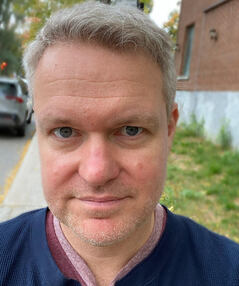 Adam Kelly Morton is a Montreal-based husband and father (four kids, all seven-and-under), who teaches acting and writing for a living. He's had stories published in Canada, the US, and the UK, and has an upcoming piece in A Wild and Precious Life: A Recovery Anthology, to be published in 2021. His debut collection was released in May, 2020. Adam is currently working toward an MA in Creative Writing from Teesside University, UK (distance). Short Fiction ~ Cyril Dabydeen Honourable Mention, Strands International Flash Fiction Competition - 10 He keeps at it with style, about having recently recovered from a hip operation--what he wants me to know. Now he’s doing well. How well? “But...?” I ask. Milt grins; he’s in his sixties; as is Jim, his friend—a twosome. Both are retirees from the federal government, and they make no bones about it. Milt thinks about the pension he currently receives, and gloats, “If I live up to 85, that means I’ll get a million bucks from the government; I’ve done the math, sure. Christ, it’s like winning the lottery!” he crows. I wait to hear more, looking at his almost rotund form--unlike Jim. “But the government--it’s the office politics I couldn’t stand!” Milt snaps next. “Aw, what politics,” mocks Jim, looking at me askance. Yes, me. And again, it’s about Milt’s recent hip operation. “I must try to get all the body parts I need now,” he grates. “Really?” “Before it’s too late, dammit,” he hisses. Jim laughs. I bide my time, sort of, now indeed considering body parts in the offing. Old age, see, with Alzeihmer’s, dementia. Physiology, not psychology. I look at them both with curiosity. “Get it all now, once you sense it coming--the little pain in the bones, I mean. Yes, go and get it.” Milt’s eyes really focus on me. Jim nods; and he’s heard it all before. “Because body parts will no longer be available with all the seniors now putting a premium on limbs,” Milt rationalises. “Soon we will all be waiting in line, like in your common grocery store.” Simple matter-of-fact logic—here in the men’s change-room after the swim. Not a doctor’s ward, ah. Milt’s face mirrors a new reality, he and Jim being here to kill time. I watch them having a “social moment”—like a genuine senior’s moment after swimming in the pool marked out for the elderly. “Parts are bound to be scarce, see,” Milt continues; then again about his hip operation. “It was quick, the bone cartilage replacement...titanium. In the hospital they wanted to send me home after two hours,” he almost shrieks. “But?” I ask. “I told them I need physio for two weeks; I insisted on it. I didn’t take acting classes for nothing.” “Acting classes?” “I could have been one--” “One?” “An actor. You’ve got to...these days.” Who’s really acting now? “Get all the body parts you can soon, bud,” he calls me in his thespian’s style. Milt’s now adamant. “Let the young people pay for it, the new workers. Christ, yes!” Jim simply nods. “Must I pay…?” I say. “Think, man,” Milt beckons me. "I am thinking,” I admit to parlaying, not demarcating, “What if I need a new brain?” I try humour, like my ploy. Jim bursts out laughing. Milt has a jaded expression. “You can get that too, can’t you?” Who is cynical? “How about a new soul?” I attempt next. Why not? Milt looks at me in consternation. New soul? “Maybe you really need a good soul,” he excoriates. “But not a bad soul, eh?” Jim scoffs. The transformative guru in me now: “It’s about one’s karma.” “You’re getting metaphysical on me, man,” Milt peers into me. “Now if you see a beautiful woman–naked, I mean....” he raises his arms suddenly. Thinking…what? I balk at his brand of metaphysics, not aesthetics. Objectifying …who? Transcendence is in the offing, see. Milt adds, “You will still lust after--?” “I will think only of...,” I try. “Her beauty, is that it?” Milt forces the words out. Ahem. Our jousting continues. Milt and Jim eye each other, then again look at me--as if to say “He really wants a new soul.” But wherein lies my soul? What neurons, molecules? A genuine social moment it is! I invoke famed neurologist Oliver Sachs. But indeed it’s getting genuine body parts because of the panic about Alzheimer’s and dementia just around the corner. Covid-19, too. Watch out! And body parts being scarce in the capital-city--here like one’s hallowed place. Let Milt and Jim have it their way, I concede. But it’s not like being in a monastery here, nor a place of pilgrimage or retreat. Milt casts a weird look at me. Jim’s in on it, too. Now what acting lessons must I take? I imagine being, well, Marlon Brando. Jim’s lips twitch. Milt, well, he won’t come here again. And I will yet consider having a new soul. Metaphysics, yes. One female swimmer appears, out of the blue--mermaid-like, from deep undersea, you bet. Fantasy! But now, it’s really like having half a heart, half a kidney, and one lung stretched thin. I breathe hard and stretch my arms out. Hip joints pulled tight. Tissue, ligaments with titanium. Oh, a new soul I yearn for, believe me. I look left and right, for the imaginary mermaid thinking of an exquisite body and soul, yeah! ~  Cyril Dabydeen’s recent books are My Undiscovered Country (Mosaic Press), God’s Spider (Peepal Tree Press), and My Multi-Ethnic Friends (Guernica). Previous titles include: Jogging in Havana, Black Jesus/Stories, Berbice Crossing, My Brahmin Days, North of the Equator, Play a Song Somebody, Imaginary Origins: Selected Poems, and Drums of My Flesh (IMPAC/Dublin Prize nominee, and Guyana Prize for best novel). Nominated for the Pushcart Prize, he twice won the Okanagan Fiction Prize. Cyril’s work appeared in the Oxford, Penguin, and Heinemann Books of Caribbean Verse and Fiction. A former Poet Laureate of Ottawa, he taught at the UofOttawa for many years. Short Fiction ~ Edward Barnfield Honourable Mention, Strands International Flash Fiction Competition - 10 ‘Tomoko’s Web’ is the largest exhibit in the gallery, a free-standing technicolour textile sculpture the approximate size of an aircraft hangar. There’s a cute note explaining the artist’s inspiration, some fable about watching kids clamber over an earlier installation. Daniel always smiles at that. The Children’s Gallery is full of cute notes, writing on the wall designed to reduce your guilt about dumping your offspring here for an afternoon, keep up the pretence that the scribble corners and junkyard xylophones are ‘educational’. The space is designed around the writings of Mihaly Csikszentmihalyi, a psychologist who argues people are happiest when they ‘flow’, so you know what to expect. Ceri loves the web. First time they came here, she ran to it, slipped off her shoes and bounced in her socks on the padded floor. The sculpture is full of false entrances and springy dead-ends, loops where the kids can climb up but can’t get inside. If they’re persistent enough, they can find the right hole to enter the valley, access the real excitement. There are swings built with bags of canvas like stunned insects, and the more athletic youngsters leap from the ropes and slide down the sides. Alongside the instructions not to run and banning gum, there is a text box explaining that the whole concept is designed to encourage risky play, enable kids to practice regulating their fear. Of course, it’s perfectly safe. That’s the trick of ‘Tomoko’s Web,’ the illusion of danger, the opportunity for the child to rise to a level he or she is comfortable with. If anything, the participants are part of the exhibit – it’s the parents who experience the spectacle, the unease. Like today. Someone’s child is howling, and a mother is trying to peer through the outer seam to trace the location of the sobs. There are two boys Daniel doesn’t like the look of untying their laces: fat and pale, English and entitled, and older than Ceri by at least three years. He catches himself, fights down the paternal throb of pre-emptive anger. No point losing it at a couple of gobby eight-year-olds. Besides, he tells himself, he’s used to it now. They come here on the weekends when they are on this side of town; Cynthia, his wife, peeling off for a coffee or a shop nearby. Daniel has learned not to react when he loses track of his daughter among the strands. Once, he saw her fall three levels, plunging from a ceiling rope to land laughing in a smaller net at the base. It’s all useful practice, aversion therapy to fight down the hum of parental paranoia. You can’t always be there to protect them. She’s about six feet above him now, grinning down from a tiny slit in the side. A presentiment of adolescence and beyond. When she’s 9, Ceri will cut her knee on a broken tumbler at her friend Grace’s house. Daniel will be sharp with Cynthia for about a week afterwards. (Grace’s mum being a friend of Cynthia, inflaming his suspicions of the parenting skills that made the accident possible.) In the now, Ceri has found a silk-hinged trapdoor, and is wiggling through a crawlspace beneath the main web. Daniel can barely make out her yellow dress, brown hair through the bright fibres, and winces when there’s a flash of football shirts in the layer above, the two boys wrestling. Again, Tomoko has anticipated, ensured there’s enough cross-stich to prevent any contact. When she’s 14, over the summer, Ceri will retreat to her room and stop eating. Cynthia will schedule appointments with specialists. A haunted sense of failure touches everyone in the house, as though a missed symptom or lost puzzle piece enabled this sickness to infiltrate. Finally, a week before school restarts, Ceri will emerge and ask for cornflakes. Daniel and Cynthia sob, separately. She is up among the swings now, climbing monkey-style to the absolute apex, where a second industrial safety net prevents any further escalation. Even after all these visits, he still has the urge to cry out, call her down, but he forces himself to ignore it. She jumps, graceful as a swan dive, and lands in one of the smaller inner webs. Again, the laughter. University will be difficult. Ceri will miss out on her first choice, victim of some obscure new Department of Education mandate. (Grace, with worse grades but richer parents, is accepted). Daniel and Cynthia have separated by this point and, as they trade blame in a coffee shop, he’s struck by a vision of the scar on her knee. There’s commotion, a clash of bodies at the web’s centre causing squeals and side-line interference. One of the Dads is remonstrating with a staff member, honking about safety codes, and another is trying to climb in on a rescue mission. Daniel knows it’s futile. ‘Tomoko’s Web’ has tensile strength enough to hold a family-size car, but the entrances all narrow to keep the adults out. He thinks he hears Ceri cry, imagines one of the football boys rolling over her. At 22, having graduated with honours, Ceri will celebrate with her on/off boyfriend and three of his college friends. When they leave the apartment, she will notice that the driver is having trouble focusing, his speech slurred. She does not get out of the car. Daniel is asleep when the phone call comes. The angry father collects his daughter from a porthole, carrying her out despite her protestations. The Tom Cruise manque still has one leg stuck when his son (the fatter of the fat eight-year-olds) escapes with a nosebleed and a sheepish expression. Daniel waits for a minute, holds his breath, his hopes for his daughter’s future all tangled. Finally, two feet in blue socks touch down on the cushioned ground. He lets out a silent prayer to Tomoko – Ceri, safe once more, now and forever. ~  Edward Barnfield is a writer and researcher living in the Middle East. His stories have appeared in Lunate, Leicester Writes, Cranked Anvil, London Independent Story Prize, The Short Story, Reflex Press, Communicate.ae, GoArchitect and Grindstone Literary. He is currently working on a novel and a collection of short stories. He’s on Twitter at: @edbarnfield Short Fiction ~ Gillian Brown Honourable Mention, Strands International Flash Fiction Competition - 10 A sense of possession swells Alice’s chest. Even the clusters of shivery grass that stand outside the fence belong to them now. Her thoughts jump to the future. Children skip about, playing hide and seek. A little boy sticks his head out from behind a mulga bush. ‘Here, Mum!’ he says, too young to understand the game. Her fists tighten. She must be patient. She and Sam came out here together, following their dream. Land in the outback was free for the taking but making a home of it has meant two years’ hard work. Without Sam’s skill and endurance, they’d still be living in a makeshift shelter, under scraps of canvas. Or… perhaps not living at all. Alice opens the wooden gate that Sam has made from strips of stringybark. She traces her fingers over the lettering carved on the front: Alice & Sam. And underneath: A Place Called Home. For their eyes only. Their nearest neighbours live several hundred kilometres away. A smile crosses her face as Toby, their aging cob, neighs from the makeshift stable round the back, hungry for his supper. On the horizon, Sam’s silhouette grows bigger. His wide shoulders. His measured step. Two rabbits swing from his left hand. In the other is his rifle. Alice’s stomach rumbles. Its immediacy gives temporary distraction. The doctor’s words, ‘Conception is possible, but unlikely,’ cling to her like a bad odour she can’t wash off. She won’t tell Sam. He too dreams of a family. Especially a son. ‘Light the fire, girl,’ Sam says, planting an affectionate peck on her cheek. Alice turns away. ‘Righto.’ ‘What’s wrong?’ She manages a smile. ‘Nothing.’ She’ll tell him when the time is right. Not today. The fire they share each night, outside the front porch, not only cooks their meal but eats up their solitude. Long after they’ve eaten, she gazes into its embers. In those moments, content. This is home now. It belongs to them. Together, they’ve made it so. Stage one of the plan is in place. Stage two has a setback. That’s all. One day soon, there will be the sound of little feet and laughter. A flock of scarlet and emerald parakeets fly by. They shriek at each other in a language only they can understand. ‘One big, happy family,’ she says. A lump rises in her throat, before she can stop it. She glances at Sam and sees his mind is elsewhere. For him, practicalities come first. He just assumes babies will come – a natural consequence of their lovemaking. They eat their rabbit in companionable silence, chewing the meat from the bones until only a skeleton is left. But tonight, the embers give Alice no peace. Each dying spark seems to sear her flesh and burn into her soul. Next day, Sam announces he is off to buy provisions in the market town, three days’ ride away. She hides her fear of being left on her own. Until now they’ve survived on what they brought with them, along with food from Sam’s hunting and gathering, and a supply of home-grown cabbages and potatoes. Rain water is stored in the huge tanks Sam constructed. Enough for drinking, and for Alice’s vegetable plot, down by the creek. Often dry. ‘I’ve run out of ammunition,’ Sam says, ‘and much besides.’ Alice gives him a list of her own. ‘Okay,’ she says lightly, but her heart is heavy. He saddles Toby, kisses Alice goodbye and trots off. After he’s been gone a week, she starts to pace. She can’t concentrate, forgets to eat. Ten days seems like a decade. After two weeks, her insides feel as hollow as the trunk of a dead eucalyptus. What could have happened? She picks at her raggedy sleeve, picturing the new smock he promised to buy her. Gripped by shame at her lethargy, she makes dough with the last remnants of flour. When she pulls the loaf from the mud oven, she tears at it with the hunger of a starving dingo. But it tastes of nothing. The sky whitens with heat. A flock of parakeets fly in. Alice throws some crumbs on the ground towards them. The birds land, gingerly moving closer. After eating, they huddle up together with an air of intimate contentment. Alice wipes a tear from her cheek. Next day, she sets off with the spare rifle Sam left her. ‘For emergencies,’ he said. Soon, a wallaby hops by. Her finger shakes on the trigger. The marsupial’s big, dopey eyes seem to plead with her. She lets it hop away. Hunger chews at her gut. When it comes back, she kills it. Sam told her stories about Ned Kelly and other highwaymen. How they rob and kill for a living, getting rich off others’ hard-earned savings. Sam has taken most of theirs with him. She starts to lose count of the days he’s been gone, but it is as clear as the Southern Cross in the night sky that he isn’t coming back. She roasts the meat on the fire, wondering what to do. Not only has she lost the man she loves, her dream of a family is history now. She lets out a long, shuddering sigh. In the morning, she chisels a wooden cross for Sam’s grave. And one for Toby. When the wattle comes into bloom she’ll lay a bunch beside them. Time passes. Between sunup and sundown, she gathers bush-tucker and kills game to eat. The parakeets creep up closer and closer to the house. They peck at the ground, demanding crumbs. ‘Sharing my breakfast with the birds!’ Alice laughs for the first time in weeks. ‘Part of my new family.’ She sinks back into the shivery grass and gazes up at the great expanse of sky, imagining Sam looking down. She lays a hand on her stomach as her son’s feet kick inside her; strong and determined. Just like his father. ~ 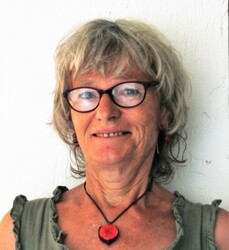 Gillian Brown started out as a travel writer but now concentrates on fiction. Her inspiration often comes from her travels or real life experiences. Motivation comes from short story competitions, for which she has a mild – but enjoyable – addiction. She has had stories published in magazines, in anthologies and online and won and been shortlisted in various competitions. Short Fiction ~ June Hunter Honourable Mention, Strands International Flash Fiction Competition - 10 Manno watched his wife and young son, wrapped up in each other as they slept, and held the imprint of their peaceful closeness in his mind as he crept down the stairs. His footsteps made no noise, and the front door was quiet as it clicked behind him. Outside the night was clear, the wind a soft rustle in the trees and a hush along the grass. He left behind the silent coffee shop, the empty grocery store, the sleeping cottages and bungalows. Later there would be grey, smudged CCTV footage of him as he crossed the forecourt of the service station at 3:20 am. His dark curly fringe emerging from beneath his hoody. His white face stark in the greyness. As he made his way out of the town his strides were longer and deliberate, and Manno felt an easiness from the back and forth tipping weights, and loudness of his thoughts. An energy after the exhaustion of his never ending despair. He noticed no one on the road - no person, no car, no animal in the fields. Only shapes of gorse bushes looming on either side, and above him a basin of stars. He could smell the countryside and hear the sea in the close distance, but he perceived all of this as if he was sensing it through a straw. Later an insomniac runner would recall a man in a hoody, and how his eyes seemed empty and bulging. The runner didn’t think the man had been aware of his passing presence. Manno took the gravel path off the main road down to the beach, the loose stones crunching beneath his feet. He could hear the pure sound of water trickling down the hillside as it made its way to the sea, and the sigh and whisper of the waves as they rolled onto the sand and faded away again. He didn’t remove his shoes as he stood at the water’s edge and gazed across the bay. In the distance he could see the flickering lights of the town he had just left and remembered the image of his wife and child, curled into each other as they slept; his wife’s face peaceful as the morning, as she wandered through her dreams. Later she would tell a reporter that his absence was uncharacteristic, even though he had been dealing with some issues. Manno couldn’t tell whether the tide was coming in or going out as he walked into the sea, his eyes focussed on the darkness ahead. Nor whether the water was cold or warm as it rose up his body. When it covered his head he turned to float on his back and was calm as he stared at the sky full of stars. He didn’t struggle when the waves covered his face and all he heard was silence. His only anxiety was that which crushed him for what he could have been. Even as he felt a burning in his chest when he inhaled water into his lungs, he didn’t fight. His vision blurred and faded out. As his body shut itself off, he felt only euphoria. Later his wife wondered how it was that you could love someone to the moon and back, and it still wasn’t enough to make them stay. ~ 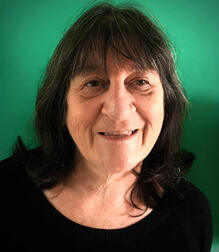 June Hunter lives and writes in Sneem, County Kerry, Ireland. Her work has been featured in Second Chance, Mash, Flash Fiction Magazine, Reflex Fiction, Potato Soup Journal and The Blue Nib. She participates in two writer's groups – Clann na Farraige, Kenmare; and Sneem Writer’s Group. Short Fiction ~ Linda Wastila Honourable Mention, Strands International Flash Fiction Competition - 10 Dear Mom, you write, Boston is good. Your pen, the one you stole from the Holiday Hotel’s front desk, pauses over the postcard you stole in Faneuil Hall. You don’t write how your fingers go numb from cold every morning when you scavenge the green trashcans that line Newbury Street for tossed half-drunk lattes and bags filled with torn croissant and muffin crumbs. You don’t dig too deep in the garbage, though, never too deep. In fact, you don’t tell her where you get your meals; you don’t mention food or shelter or Nikko at all. You don’t tell her you’re writing from a damp park bench in the Fens where Nikko and a man, silver at his temples to match the thin stripes in his suit, have disappeared into tall waving grasses. The music is great, Mom, you write instead. Musicians everywhere. We play in Harvard Square. We want to book a studio, press a CD because, Mom, people like our songs. People like us. And passersby do appreciate your music. They drop quarters, a bill or two after listening while they lick their chocolate mint ice creams. Good nights you rake in thirty, forty bucks but you don’t tell your Mom that good nights happen rarely, that usually police scatter you with their batons because you don’t have a busker license. And the people are nice. I don’t know why you and dad ever left this city. Last week a lady who looked like your Mom—same age, same streaky blond hair, same hazel eyes which look at you with pity—fluttered a twenty into your guitar case. Since then, every night as you drift on the cusp of sleep, the way that lady looked at you burns red against your eyelids, and you carry that memory into your dream. The same dream you have every night while Nikko prowls the city, of how you fly above stars and circle the sun held aloft by a lightness, a freedom, and then how you fall, tumbling and flailing through clouds, while below you the green-blue marble of earth looms closer: mountains, trees, roads, your town, the church your father ministers and where you sing in the choir, the dirt path through woods to school, your house, and just as you brace yourself to crash through the roof, the angel swoops down, her white white wings swallow you with silver heat; she pulls you close, the angel, and her eyes fill with light and pity and compassion, and as you surrender into her she opens her wings and you spin to the ground, a sonic boom. You wake the same way every time, your body twitching in the moldy sleeping bag you call home. Streetlight filters through the plastic bag draped at the end of the refrigerator box. The smolder of campfires opens the morning. You reach for Nikko, for warmth, for reassurance, to trace the angry red lines marching down his inner arms, but he’s gone. He’s always gone. Remembering, you shiver on the bench. Nikko emerges from the grasses, alone, and pumps his fist in the air, green clenched between his fingers. You hear him mutter about getting a hotel room tonight if you can’t get into the hostel. You know, though, the money will be gone by then. He slumps beside you, the bills float to the bench, and cries. You rub his back, pocket the two tens, and pick up your pen. Dear Mom, you write again. Boston is good. There are angels here. ~ 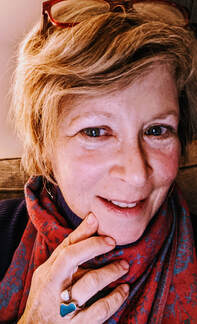 Linda Wastila writes from Baltimore, where she professes, mothers, and gives a damn. Her Pushcart and Best-of-the-Net nominated prose and poetry have been published in The Sun, Smokelong Quarterly, Monkeybicycle, Blue Fifth Review, The New York Times, Camroc Press Review, The Poet’s Market 2013, Hoot, Every Day Fiction, and Nanoism, among others. In 2015, she received her MA in Writing from Johns Hopkins. When not working on her novels-in-progress, she serves as Senior Fiction Editor at JMWW. |
StrandsFiction~Poetry~Translations~Reviews~Interviews~Visual Arts Archives
April 2024
Categories |
 RSS Feed
RSS Feed